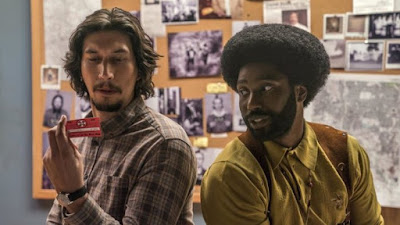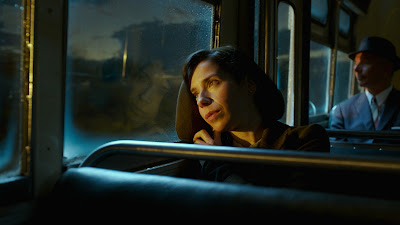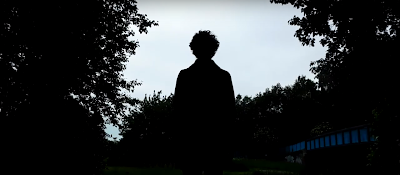BlacKkKlansman
BlacKkKlansman - A Wake-Up Call
"Wake Up"! These are the words that Spike Lee has been saying to us since the 80's. They are the last words that we hear in 1988's School Daze. They are the first words we hear in his masterpiece on racial relations in America, Do the Right Thing. "Wake up to what's happening in America and the world! Wake up to the racism and hate!", he has been telling us. However, for the longest time, he has been accused by many of "reverse racism" for his controversial takes on American society. But he's fone telling us to wake up. Merely saying it isn't enough. BlacKkKlansman is a slap to our face (maybe more than a slap), for us to finally look at society with open eyes and see the vile hate that is present in it. In a way, it's a continuation of last year's amazing debut masterpiece from Jordan Peele, Get Out, which was the first warning. It used allegories to tell us about the rot in American society that is racism. But now we get a literal and true story of the deep societal racism that infects not only America, but the entire world, and puts us face to face with reality - along with what is probably the coolest musical scores ever composed.
In this film, we follow Ron Stallworth - one of the coolest characters ever written, played brilliantly by John David Washington, who has most definitely inherited his father's talent - the first African-American policeman of Colorado Springs. He has to face deeply ingrained racism within the police force, constantly having to deal with racial slurs. Eventually, he decides he wants to do undercover work. He is assigned to infiltrate a Black Power rally to undermine the movement (a threat to the racist system). In the rally, he comes in contact for the first time with an ideology for the worldwide liberation of black people and starts to identify with it. He went there to undermine the movement but ends up agreeing with what he hears. In this rally, he meets Patrice - one of the most interesting characters of the film for her deeply ideological personality, portrayed so well by Laura Harrier - the president of the Black Student Union, who also contributed to "wake Ron (and us) up".
After this, Ron finds an ad in a newspaper for the KKK. He decides to contact and infiltrate them. He will do to the KKK what the police wanted him to do to the Black Power movement. What is more brilliant than that is the fact that he will use the police force - one of the forces responsible for enforcing racist segregation - to carry this out! Of course, there's a catch - Ron is black. He would never be able to infiltrate the KKK. However, unlike what the Klan says, black people are an intelligent and resourceful people - Ron will establish contact via telephone while a white police officer will play "white" Ron Stallworth to fool the white nationalists. This may seem like one of the craziest plans ever, but craziness is what is necessary to get things done and really make changes.
And so, the police captain agrees to this mad plan, and Flip - amazingly portrayed by Adam Driver - will be the "white" Ron. There is another catch here - Flip is Jewish. This character is also extremely interesting since he also slowly wakes up and becomes more aware of racism and anti-semitism throughout the film.
The most brilliant aspect of this film is how Spike Lee, all through the film, "winks" at us, doing constant references to the present of the United States. The most obvious time is a scene where the Klansmen shout "America First". All throughout the film, Ron is told to wake up, either directly or indirectly. During a particularly interesting dialogue between him and his sergeant, Ron is told about how David Duk, the Grand Wizard of the Klan, has a less (explicitly) violent, more mainstream philosophy in order to appeal to the masses and eventually reach the White House. Ron sneers and says that he can't seriously believe that - the American people would never elect the KKK. To which the Seargent responds that he is too naïve for an African-American. "Why don't you wake up?", he asks him - and us. This is one of the moments Spike Lee winks and talks to us directly. We never believed that any far-right group could rise to power. We naïvely believed this. Well, look at the US and Europe now. Look at the White House and who is sitting in the Oval Office. Look at what we have done. Why didn't we wake up?
I also want to talk about Patrice. I really liked this character and her stubbornness in her ideals. She is the romantic interest of our protagonist, but she is so much more than such a traditionally passive character. She is the little needle that pokes Ron and alerts him. She introduces the ideals of Black Power to him. And she warns him. During one of their conversations, she talks about how the police force is part of a racist system. Ron asks her what if someone tries to change it from the inside. She tells him that it can't be done, the system would refuse to change and do everything in its power to suppress it - and she's right! The fate of Ron and Flip's unit is proof of that!
Another amazing aspect of this film is the irony present in it. The KKK and David Duke, with their white supremacist ideology, are outsmarted by people from ethnicities they consider as inferior - African-Americans and Jews. After all the nonsensical, racist drivel we hear pouring from their mouth holes (including things as outlandish as saying that America is a country racist against white people - which goes against every empirical evidence possible and impossible), the climax of this film is one of the most satisfying and empowering things ever. It's difficult not to feel empowered by this amazing film.
And then there's one of the best endings in the history of cinema. It's an urgent ending. Oh boy, how much in need for this ending we were. I won't spoil it here, but I'll just say that it's THE most important film ending of this year. In it, Spike Lee doesn't wink at us. He doesn't even slap us. He right on punches us in the guts, taking all the air out of our lungs, grabs us by the back of our head and presses our face against the screen of reality, making us look at what we rather not look - the decadence, the hatred and the inhumanity present in our society. It's nearly impossible to breathe in the ending sequence, not only because of the power of the images shown to us and the truth present in them, but also because of how brilliantly edited they are to convey to us one of the most powerful political messages ever put in film - up there with Stanley Kubrick's Dr. Strangelove (1964) and Eisenstein's Battleship Potemkin (1925). And Spike Lee is screaming at us, "WAKE THE FUCK UP"!




Comments
Post a Comment